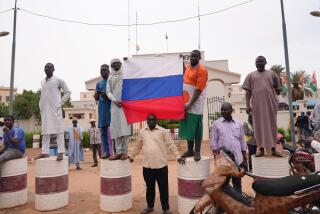Algeria Leader Assassinated During Speech
TUNIS, Tunisia — Mohammed Boudiaf, Algeria’s head of state, was assassinated Monday, five months after his military-backed collective presidency seized control of the North African nation to block the political rise of Muslim fundamentalists.
A gunman wearing a riot squad trooper’s uniform killed Boudiaf, 73, with two bursts of automatic-weapons fire as Boudiaf addressed a meeting in the Mediterranean port city of Annaba, according to the official Algerian news service, APS.
APS originally reported that Boudiaf’s bodyguards had killed the assassin, but the ruling Council of State later announced that the assassin was arrested.
Algerian state news media said that further shooting erupted and that at least 41 people were wounded--including a provincial governor and a Cabinet minister--amid scenes of “panic” and “total confusion” in the Palace of Culture and Arts in Annaba, about 375 miles east of Algiers. It was not clear who was responsible for this shooting.
Hours after the midday attack, no one in Algeria had claimed responsibility for killing Boudiaf. The high-profile assassination--in broad daylight and witnessed by scores of people--was similar in many ways to the killing by Muslim fundamentalists of Egyptian President Anwar Sadat in Cairo as he reviewed troops in October, 1981.
Muslim fundamentalists had made no secret of plans to strike back at Boudiaf for his active lead in the army-backed regime’s relentless crackdown against the Islamic Salvation Front, which until the January military intervention had been poised to win control of Parliament in Algeria’s first free elections.
In an apparently well-planned attack, possibly involving more than one person, a diversionary explosion was set off inside the auditorium where Boudiaf was speaking, Algerian television reported, then a grenade rolled under Boudiaf’s chair on the podium before the shooting started.
Algerian television showed film of Boudiaf on the podium, looking in the direction of the diversionary explosion as the auditorium crowd ducked for cover. The footage also showed Boudiaf being carried out of the hall on a stretcher, apparently still alive, before a second volley of shots resounded inside the auditorium.
“We must know that the life of a human being is very short,” Boudiaf told the audience just before the violence interrupted his speech. “We are all going to die. Why should (the authorities) cling so much to power?”
On Jan. 16, Boudiaf returned to Algeria after 28 years of self-imposed exile, mostly spent in neighboring Morocco, to lend his record of personal honesty and historic legitimacy to the five-man Council of State, which had been hurriedly named to replace President Chadli Bendjedid. Five days earlier, the army had forced Bendjedid from office to prevent the second round of legislative elections that the Islamic Salvation Front was expected to sweep.
Only last week, Salvation Front supporters had plastered mosque walls with warnings to the “puppets of the Council of State” that “we will make you pay soon,” and “we will make you wear the clothes of fear in your very homes.”
Those warnings coincided with the opening last Saturday of the trial of Salvation Front leaders Abbasi Madani, Ali Belhaj and five colleagues before a military tribunal on charges of seeking to overthrow the state and install an Islamic republic last June. The trial, in which Madani and Belhaj could face the death penalty, was postponed until July 12.
Since his return, Boudiaf, a hero of Algeria’s war of independence from France, had incurred fundamentalist ire because of his outspoken denunciation of mixing religion and politics. He had openly defended the decision to ban the Salvation Front, arrest its leaders, remove hundreds of its elected officials from office and detain as many as 9,500 militants in desert detention camps.
There were no announcements Monday regarding Boudiaf’s successor. The presidential council’s most prominent member has been Defense Minister Khaled Nezzar, one of the three generals who helped force Bendjedid from office in January.
Soon after Monday’s assassination, the military-dominated National Security Council and the Council of State convened an emergency session and later announced a seven-day period of mourning. Elaborate festivities to celebrate Algeria’s 30th anniversary of independence on July 5 were canceled.
In Washington, State Department spokeswoman Margaret Tutwiler called the killing “senseless” and said it “underlines our belief that violence cannot be the solution to Algeria’s problems.
More to Read
Sign up for Essential California
The most important California stories and recommendations in your inbox every morning.
You may occasionally receive promotional content from the Los Angeles Times.










